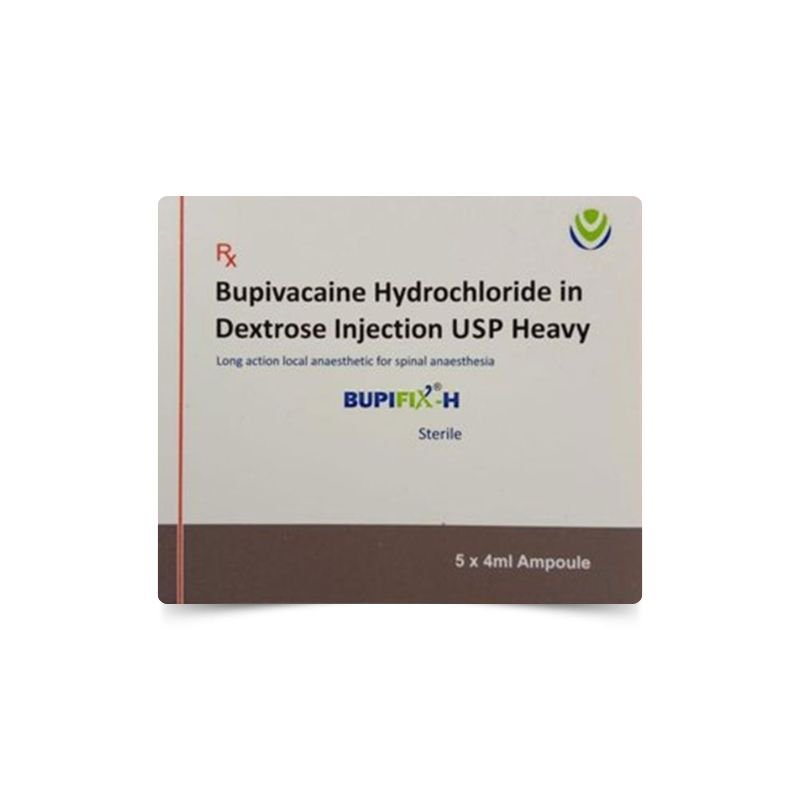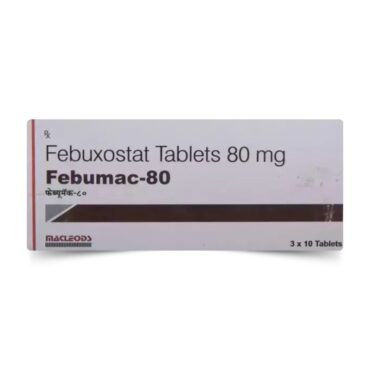Bupivucaine Hydrochloride In Dextrose Injection 4ml Bupifix H
Trade Name:– Bupifix H
Manufacturer:Varenyam Healthcare Pvt Ltd
Presentation: Injection
Strength: 4ml
Why is dextrose given along with Bupivucaine Hydrochloride?
The adjuvant typically given to local anaesthetics to change their baricity and make them hyperbaric is Bupivacaine Hydrochloride. Bupivucaine Hydrochloride 0.5 percent is combined with 8 percent dextrose to create “heavy bupivacaine,” which is marketed for intrathecal usage.
Are Dextrose and Bupivucaine Hydrochloride?
For subarachnoid injection, a sterile hyperbaric solution of bupivacaine hydrochloride in dextrose is available (spinal block). Chemically and pharmaceutically, bupivacaine hydrochloride is related to aminoacyl local anaesthetics. It is chemically linked to lidocaine and is a homologue of mepivacaine.
How Does Bupivacaine Work and What Is It?
As a local anaesthetic, the prescription drug bupivacaine is utilised (numbing medicine). The nerve impulses that cause pain are blocked by buprenorphine. Marcaine and Sensorcaine are two of the various trade names for buprenorphine.
What is heavy Bupivacaine Hydrochloride?
- The amide type of local anaesthetic bupivacaine has a long half-life. Lower extremity
- muscles are only slightly relaxed.
- The abdominal muscles’ motors are blocked.
- Due to its hyperbaric nature, Marcain Heavy’s initial intrathecal distribution is influenced by gravity.
To know more, Click here
We utilise hyperbaric Bupivucaine Hydrochloride for what reason?
An amide local anaesthetic called bupivacaine is utilised in isobaric and hyperbaric settings. These are used to provide regional anaesthesia for caesarean sections and are administered intrathecally into the spine.
How soon does Bupivacaine Hydrochloride start to work?
Bupivacaine, on the other hand, takes longer to start working (5–10 minutes after injection), but its effects endure for 4–8 hours. It is less popular as a primary source of local anaesthetic in outpatient hand surgery because of the delay in the commencement of effect.
What negative consequences does Bupivacaine Hydrochloride have?
- Negative effects
- Feelings of “pins and needles,” burning, crawling, itching, numbness, or tingling.
alteration or loss of flavour, chest discomfort or agony. - an ongoing buzzing, ringing, or other strange sounds in the ears.
decrease in both urine production frequency and volume. - Unpleasant or challenging urinating.
- heightened thirst
What impact does Bupivacaine Hydrochloride have on the heart?
Local anaesthetics, in particular bupivacaine, when administered intravenously, cause reduced cardiac contractility, arrhythmia, and hypotension, which in humans can result in ventricular tachycardia, fibrillation, asystole, and total heart block.
Bupivacaine is an antibiotic, right?
For a variety of bacteria, the minimal inhibitory concentrations were calculated using a reference agar dilution approach. Staphylococcus aureus, Enterococcus faecalis, and Escherichia coli were all susceptible to the antibacterial effects of buprenorphine at minimal inhibitory concentrations between 0.125 percent and 0.25 percent.
Check this Arthritis product Adalimumab 40mg Injection Exemptia, or you may explore more Arthritis products by clicking here
We are an exporter from India and work in several countries like the UAE, Oman, Qatar, Myanmar, Saudi Arabia, Netherlands, Albania, Saint Lucia, Jordan, Romania, South Africa, etc.







